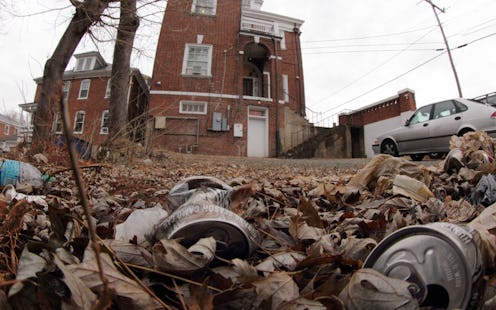News
Rolling Stone's Fact-Checking Fell Way Short
The investigation into Rolling Stone's flawed story of an alleged gang rape at the University of Virginia has officially come to a close, but the decision to keep all involved editors and staff members on board has left many wondering whether anyone will be held accountable for the article's faulty reporting and editing. According to CNN, Rolling Stone publisher Jann Wenner has decided that no one will be fired on staff, including author Sabrina Rubin Erdely, editor Sean Woods, and managing editor Will Dana. The blatant disregard of basic Journalism 101 lessons, detailed in numerous reports from The Washington Post, has triggered questions over how Rolling Stone fact checked the alleged rape article.
According to the investigative report, authored by the Columbia School of Journalism, Rolling Stone's main problem was its failure to simply pick up the phone and ask questions regarding the account given by Jackie, the pseudonym used for a then-18-year-old UVA student who claimed that seven men brutally raped her at a frat party in September 2012. Jackie said she told three of her friends, also deliberately unnamed in the story, about the attack and found them unsympathetic to her story. The three friends, identified as Andy, Randall, and Cindy in the Rolling Stone story, later told The Washington Post that they were never contacted or interviewed by the magazine. In fact, with its reputation on the line, Rolling Stone fully relied on one source: Jackie.
When a reporter covers an alleged crime, the standard journalism practice is to reach out to the accused and offer them the chance to say their side. In the story, there were no indications that attempts were made to contact the alleged attackers. Phi Kappa Psi, the fraternity accused of hosting the party where Jackie claimed the rapes took place, said in a March statement that Rolling Stone 's story was a "rush to judgment" and failed to give due process to the accused fraternity.
The due process rights of college students must be respected in any investigation that commences against a student or organization accused of such serious charges.
The Rolling Stone story also chose not to identify the accused men, who reportedly belonged to the fraternity. Woods, who was the article's main editor, told The Washington Post that Erdely didn't talk to the alleged attackers and that the publication couldn't reach them. The article instead relied on loose identifiers such as the men's alleged affiliation with the fraternity Phi Kappa Psi. The reported ringleader Drew was said to be a UVA junior and lifeguard at the university swimming pool. According to The Washington Post, Woods said the story didn't name the men since "we were telling Jackie's story. It's her story."
I'm satisfied that these guys exist and are real. We knew who they were.
Erdely also told The Washington Post she refrained from using the alleged attackers' names out of respect for Jackie's wishes. She declined to comment on whether she knew their real identities.
(Jackie) asked me not to name the individuals because she’s so fearful of them. That was something we agreed on. She was nervous about naming the frat, too. I told her, "If we’re trying to shine a light on this, we have to name the fraternity."
Another opportunity to fact check its story came through Rolling Stone's interactions with UVA officials. The Huffington Post found that emails between UVA officials, Erdely, and assistant editor Elisabeth Garber-Paul showed a noticeable gap in reporting and fact-checking. Other than one passing reference, there is no mention of Jackie or her case in the emails, which The Huffington Post obtained in a Freedom of Information Act request. While those allegations may have been asked via phone, the lack of clear and direct questions related to Jackie in 104 pages of email correspondence showed a serious lapse in editorial judgment.
How Rolling Stone could fall short at multiple steps in its editorial process came as a surprise to not only outsiders, but also some within the organization. On radio program "Imus in the Morning," Rolling Stone journalist Matt Taibbi described Rolling Stone 's fact-checking as a "really difficult, long, thorough, painful process." He said the magazine was "devastated" over the flawed story and added he always felt safe publishing with the magazine because he knew stories would always be double-checked.
For people like me and for a lot of the other reporters who’ve worked there over the years, this was a real shock to us because, speaking personally — people laughed at me when I said this on Twitter — what I go through normally in the fact-checking process at that magazine has always been a really difficult, long, thorough, painful process.
Let Rolling Stone's UVA debacle be a lesson to all journalists: always fact check. Then fact check some more.
Images: Getty Images (2)
